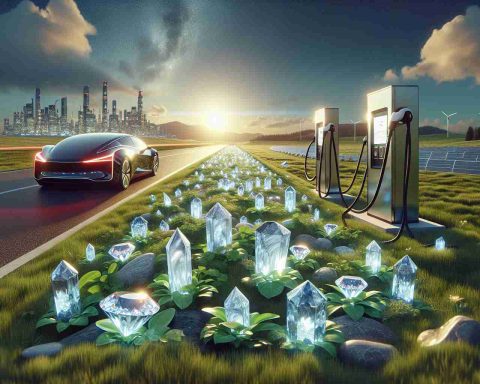Overview of a Groundbreaking Energy Project
Saudi Arabia has recently achieved a landmark in renewable energy with the launch of its most extensive battery energy storage system (BESS). Nestled in the southwestern region of ‘Asir, the facility is a formidable 500 MW/2000 MWh powerhouse, shining as the world’s largest operational single-phase energy storage project.
This ambitious project in Bisha consists of 122 prefabricated storage units crafted by BYD, a prominent Chinese manufacturer. Each unit is equipped with advanced technologies, including a robust 6 MW power conversion system coupled with four lithium iron phosphate (LFP) battery modules. This meticulously designed modular system maximizes space and boosts reliability by reducing possible failure points.
The construction faced formidable challenges due to the harsh desert climate, where extreme temperatures and sandstorms are common. Engineers employed innovative installation techniques to combat these issues, ensuring the project’s long-term success.
This BESS is a vital part of Saudi Arabia’s Vision 2030 initiative, aimed at generating 50% of the nation’s energy from renewable sources. Energy storage plays a critical role in this vision, enhancing grid stability and facilitating the use of renewable energies like solar and wind.
In addition, the Saudi Power Procurement Company is actively seeking more ambitious battery projects, signaling a robust commitment to evolving its energy landscape and increasing sustainable practices.
The Broader Impact of Saudi Arabia’s Energy Storage Initiative
Saudi Arabia’s groundbreaking battery energy storage system (BESS) in ‘Asir signifies more than just a technological feat; it heralds significant shifts in society, culture, and the global economy. This facility not only bolsters the Kingdom’s energy independence but also sets a precedent for renewable energy adoption in oil-rich nations traditionally reliant on fossil fuels. By diversifying its energy portfolio, Saudi Arabia may reshape regional energy dynamics, potentially offering neighboring countries a template for their own transitions towards sustainable practices.
From an environmental perspective, the transition to a robust storage system supports the effective integration of renewables, mitigating intermittency issues associated with solar and wind energy. This could dramatically reduce carbon emissions and pollution in the region, fostering cleaner air and a healthier population. As other nations look to emulate this success, it may spark a global shift towards comprehensive energy storage solutions, thus reinforcing international climate commitments, such as those outlined in the Paris Agreement.
In looking towards the future, this project could pave the way for investment in green technologies and innovation in energy management systems. Given that battery technology is rapidly advancing, we may soon see significant cost reductions and enhanced efficiency, enabling broader accessibility and integration into everyday life. As battery storage becomes increasingly prevalent, its potential to transform energy consumption habits and drive sustainable urban development cannot be understated. The long-term significance of projects like these will surely resonate well beyond Saudi borders, influencing global energy strategies for decades to come.
Saudi Arabia Ushers in a New Era of Renewable Energy with Massive Battery Storage Project
Overview of the Groundbreaking Energy Project
Saudi Arabia has recently marked a significant milestone in renewable energy by launching its largest battery energy storage system (BESS) in the southwestern region of ‘Asir. This facility boasts a remarkable capacity of 500 MW/2000 MWh, making it the world’s largest operational single-phase energy storage project to date.
Located in Bisha, this ambitious venture comprises 122 prefabricated storage units manufactured by BYD, a leading Chinese producer in the energy sector. Each unit is outfitted with a sophisticated 6 MW power conversion system and four lithium iron phosphate (LFP) battery modules. This innovative modular design not only maximizes available space but also increases reliability by minimizing potential failure points.
Innovations and Technology
# Advanced Battery Technology
The system’s use of LFP batteries, known for their thermal stability and safety, positions this project to operate efficiently under extreme conditions. These batteries are particularly well-suited for large-scale energy storage due to their longevity and reliability.
# Innovative Installation Techniques
Engineers encountered significant challenges, including extreme temperatures and sandstorms typical of the region. To counter these issues, innovative installation techniques were employed, ensuring that the construction could withstand environmental pressures and maintain operational integrity over time.
Implications for Saudi Arabia’s Vision 2030
This BESS project aligns with Saudi Arabia’s Vision 2030, which aims for renewable energy to account for 50% of the nation’s energy sources. Energy storage systems like this play a crucial role in stabilizing the grid and enhancing the integration of renewable resources such as solar and wind energy, which are increasingly being harnessed across the kingdom.
Market Trends and Future Predictions
# Expansion in Battery Storage Projects
The Saudi Power Procurement Company is actively pursuing additional battery energy storage projects, indicating a strong commitment to expanding the nation’s renewable energy landscape. As countries worldwide transition to greener energy solutions, Saudi Arabia’s aggressive strategy places it at the forefront of this global movement.
# Potential for International Collaboration
The success of this BESS not only showcases Saudi Arabia’s capabilities but also offers a potential model for international collaboration in renewable energy projects. Countries looking to enhance their energy security and sustainability may find valuable insights from Saudi Arabia’s experience with large-scale energy storage.
Pros and Cons of the Battery Energy Storage System
# Pros:
– Enhanced Grid Stability: Helps balance the supply and demand of electricity, especially from intermittent renewable sources.
– Environmental Impact: Reduces dependency on fossil fuels and promotes the use of clean energy.
– Innovation in Energy Storage: Provides a model for future battery systems and technology advancements.
# Cons:
– High Initial Costs: Significant investment is required for setup and infrastructure.
– Environmental Concerns: Although LFP batteries are safer, the production and disposal of batteries can raise environmental issues.
– Dependency on Technological Advances: Continued effectiveness relies on advancements in energy storage technologies.
Conclusion
Saudi Arabia’s groundbreaking BESS project is a significant step toward achieving its Vision 2030 objectives, underscoring its commitment to renewable energy and sustainable practices. As the country continues to innovate in energy storage technology, it positions itself as a leader in the renewable energy sector, potentially inspiring similar initiatives globally.
For more information about Saudi Arabia’s renewable energy initiatives, visit the official government website.













